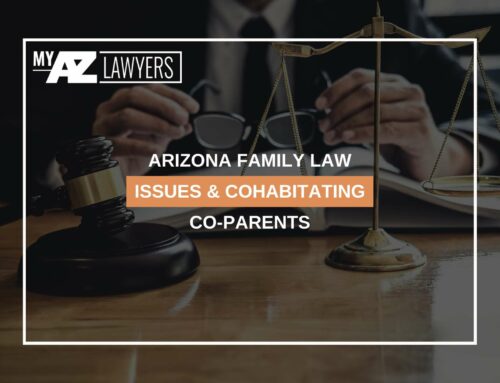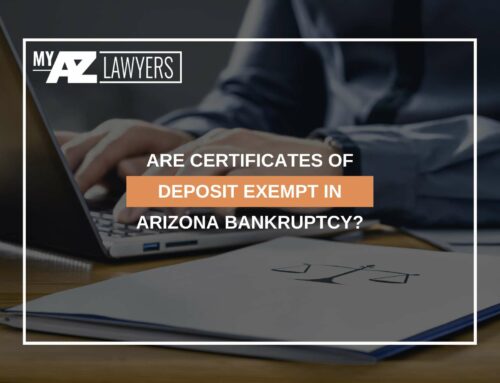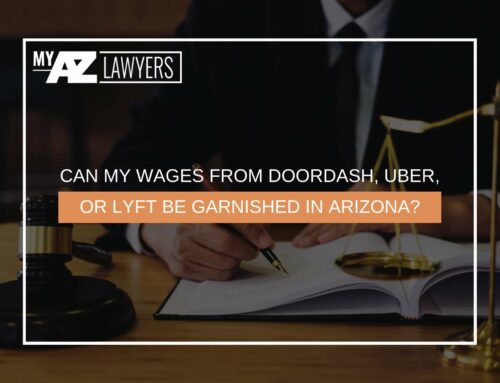What Is a Non-Earnings Garnishment?
While nobody sets out wanting a garnishment, they’re entirely uncommon due to child support and other sources of debt. Garnishments are used by creditors to collect payment for unpaid debts, either through earnings or non-earnings. Most people associate garnishments with earnings garnishments, otherwise known as wage garnishments. However, non-earnings can be garnished as well, and it can be just as financially devastating. The good news is that if you are facing any type of garnishment, filing for bankruptcy may be able to help your situation. Review your case for free with one of our experienced Mesa bankruptcy lawyers by clicking here or calling 480-470-1504.

Earnings vs. Non-Earnings Garnishments
In a garnishment context, earnings are “compensation payable for work performed by the judgment debtor and not yet paid by the employer.” Regular wages count as earnings, as do bonuses, commissions, pensions, and retirement contributions. Non-earnings are “personal property belonging to a judgment debtor but held by a third party, or money other than ‘earnings’ that is owed to the debtor by a third party.” Examples include the contents of a bank account or safe deposit box, tax refunds, unpaid rent, and more. The processes for garnishing earnings and non-earnings are slightly different.
Before proceeding with either type of garnishment, a creditor must receive a money judgment against the debtor. The judgment creditor, or the plaintiff, is the one seeking repayment from the judgment debtor, or the defendant. However, there can also be a garnishee, or a third party holding money or property belonging to a judgment debtor. Once the creditor receives a money judgment, the court doesn’t begin enforcing repayment automatically. There are multiple options that a creditor has to do with a money judgment, but garnishments are one of the more popular choices.
A judgment creditor will need to have the debtor’s address and the name of their employer or the holder of their assets to proceed with a garnishment. The money or property must be located within Arizona for the judgment creditor to proceed with garnishment through the Arizona court system. The judgment creditor should make sure all of their documents are accurate, as mistakes could mean being held liable for the debtor’s legal fees related to the garnishment.
Once a creditor has obtained a writ of garnishment against the debtor, it will be served on the debtor’s employer. Depending on when the notice is served to that workplace’s pay periods, the garnishment may be taken out of the debtor’s next check or the subsequent paycheck. Although the balance can be increased due to interest and legal fees, only one creditor can garnish a debtor’s paycheck at a time. If more than one creditor obtains writs of garnishments against the debtor, it will be first come, first served depending on who serves the employer first. Any subsequent creditors will need to wait until the first garnishment is fulfilled before theirs can begin. An employer may not legally terminate an employee due to service of a writ of garnishment or for having their wages garnished. However, an employer can terminate an employee for receiving a second writ of garnishment in 12 months.
Common Examples Of Non-Earnings Garnishments
Wage garnishments can be stressful, embarrassing, and most of all, financially draining, but non-earnings garnishments can make a financial situation worse as well. Some common examples of non-earnings garnishment situations include:
- A bank account levy: You may have several accounts through the same financial institution, such as a checking account, savings account, and maybe an attached credit card too. If you incur a debt on any of those, your bank might use a levy on one of your other accounts to collect the funds.
- Safe deposit box: Similarly, you may hold items in a safe deposit box at a bank. If you fall behind on one of your accounts with that bank, they might pursue your safe deposit box for compensation.
- Tax refunds: Many creditors, including the IRS, might file a non-earnings garnishment to intercept your tax refund to pay a debt.
- Lottery winnings: Similarly to tax refunds, a creditor may file a non-earnings garnishment to intercept a payment such as lottery winnings.
Property Exempt From Non-Earnings Garnishment
Creditors are somewhat limited in the types of funds and assets they can garnish from a debtor to collect upon a debt. Form 8, which is a Request for a Hearing on Garnishment (Non-Earnings), allows a debtor to indicate if the funds or property the creditor is seeking to garnish is exempt from garnishment. Some funds in bank accounts are statutorily protected in Arizona. Temporary assistance, social security income, veterans affairs benefits, and similar funds can’t be garnished from a bank account through a non-earnings garnishment. Pension, retirement benefits, and worker’s compensation are exempt from non-earnings garnishments. Additionally, certain household goods, furnishings, and appliances, equity in a motor vehicle, personal items, and tools or equipment of trade are exempt from non-earnings garnishment. However, being exempt from non-earnings garnishment isn’t the same as being protected from repossession. For more questions on property exempt from non-earnings garnishment, call our Phoenix bankruptcy lawyers for your free consultation at 480-470-1504.
What Is The Automatic Stay?
Automatic Stay is a legal protection that becomes effective when a debtor declares bankruptcy. In most bankruptcy cases, the automatic stay lasts from filing until discharge or dismissal. The automatic stay is a powerful tool in defending against creditors. The automatic stay stops several types of creditor collections, like lawsuits, repossessions, foreclosures, utility shut-offs, and more. Most relevant here, the automatic stay contains most types of wage garnishments. A creditor also can’t proceed with a non-earnings garnishment when the automatic stay is in effect.
Most wage garnishments stop when a debtor files their bankruptcy petition in court. If the case is successful, the debt associated with the garnishment may be discharged. If the debt behind the garnishment is cleared by bankruptcy, the creditor has no legal right to resume garnishing the debtor’s paychecks after the bankruptcy case is discharged. Some debts, like student loans, won’t be removed by filing for bankruptcy. Here, the garnishment will pause during the bankruptcy but resume after discharge or dismissal. Many parents have wage garnishments to pay child support. A child support wage garnishment doesn’t stop a Chapter 7 bankruptcy filing. A child support wage garnishment only stops if a debtor files a Chapter 13 bankruptcy that will fully pay off their child support arrearages. For more information about the automatic stay, call our firm for your free bankruptcy consultation at 480-470-1504 or click here.
Our Mesa Bankruptcy Team Can Help You Protect Yourself From Garnishment
Bankruptcy can help protect your funds and assets from earnings and non-earnings garnishments. Depending on your situation, you may have ample time to prepare your filing, or you may need to get it done quickly. Regardless, My AZ Lawyers can guide you through bankruptcy so you come out on the other side with all of your assets and little to no debt. If you qualify, we can file your case for as little as zero dollars down. Get the process started by scheduling your free consultation- contact us through our online form or call 480-470-1504.
Arizona Offices:
Mesa Location:
1731 West Baseline Rd., Suite #100
Mesa, AZ 85202
Office: (480) 448-9800
Email: info@myazlawyers.com
Website: https://myazlawyers.com/
Phoenix Location:
343 West Roosevelt, Suite #100
Phoenix, AZ 85003
Office: (602) 609-7000
Glendale Location:
20325 N 51st Avenue Suite #134, Building 5
Glendale, AZ 85308
Office: (602) 509-0955
Tucson Location:
2 East Congress St., Suite #900-6A
Tucson, AZ 85701
Office: (520) 441-1450
Avondale Location:
12725 W. Indian School Rd., Ste E, #101
Avondale, AZ 85392
Office: (623) 469-6603














